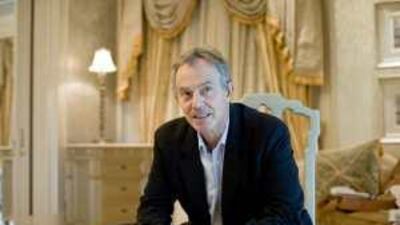ABU DHABI // The Middle East peace process may appear stalled, but Tony Blair has high hopes that a breakthrough is on the way. In an exclusive interview with The National, the Quartet's Middle East envoy was optimistic that progress would soon be made.
"I hope and believe we will reach an agreement that allows us to move the thing forward. It is essential to get this political negotiation moving." Currently, the peace process is in limbo because of a stand-off between the US and Israel over a proposed freeze on settlement activity in the West Bank. Should an agreement be reached in the near future, progress towards a Middle East peace accord faces yet another hurdle - getting the Arabs on board.
In US president Barack Obama's Middle East peace plan, Arab states have a crucial role to play in initiating the confidence-building measures necessary to shepherd in a final peace agreement. The difficulty does not so much lie in rallying support for a peace push; Mr Blair believes that exists already. "For the Arab world, there is a strategic interest in peace." The problem is convincing them that Israel is serious. "There is a lot of scepticism about Israel's intentions, and that's natural."
Mr Blair - who represents the US, the UN, Russia and the EU - partly blames this on a lack of Israeli response to the Arab Peace Initiative. "The signing of the... Initiative was an important moment. I don't think people in the West or in Israel quite understood the huge importance of it, but I think they're beginning to now." Mr Blair believes that the peace initiative has Mr Obama to thank for the renewed interest: "With a new administration in America, it takes on new significance."
But he also thinks that Benjamin Netanyahu, the Israeli prime minister, is not the impediment to peace that many believe him to be. Despite Mr Netanyahu's apparent embrace of a Palestinian state in a speech in June, many in the region found his definition of such a state lacking. Mr Blair feels that this is not fair. "In the Arab and Muslim world, Netanyahu's speech was heavily criticised, but it was important that there was a commitment to two states [in the speech]." More importantly, "it was seen in Israel as a commitment to two states".
Mr Blair noted that Mr Netanyahu's approval ratings increased after his speech. While some would argue that this is because he fell short of agreeing to a Palestinian state in the full definition of the term, Mr Blair is more optimistic. "My view is that a majority of Israelis and Palestinians want a two-state solution, but the majority of the people have given up hope that it is going to be achieved."
Mr Blair thinks that progress must be made soon to revive these hopes, and he feels the challenges are not as insurmountable as the majority of Israelis and Palestinians seem to believe. "It's not impossible for people to agree what the territory of a Palestinian state should be, and, even on a subject like Jerusalem, if you want to find a way through you can find a way through." But Mr Blair sees the political debate and the wrangling over borders and territory as the easy part. He thinks too much attention has been paid to negotiating a final agreement, and not enough to the practical considerations that should take precedent. "If the facts on the ground contradict the possibility of that agreement either because of the occupation on the one side or the security worries on the other, you won't get a state, you won't get that agreement."
Unless the security concerns of the Israelis can be satisfied and the economic stifling of the Palestinian Territories is ended, peace is unattainable. "If you don't have security and economic development, the politics is just unrealistic." smclain@thenational.ae

